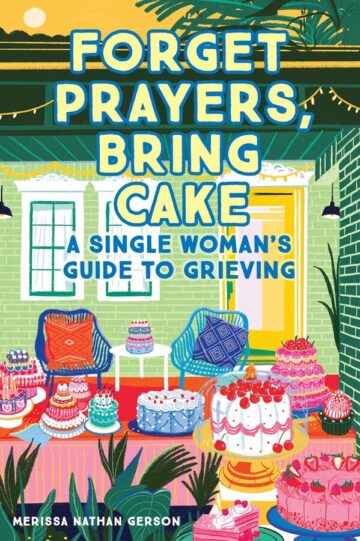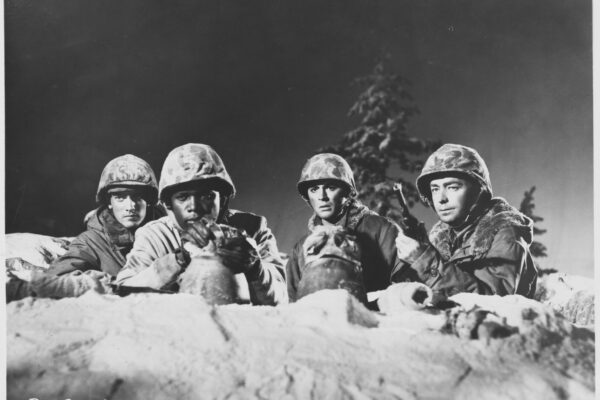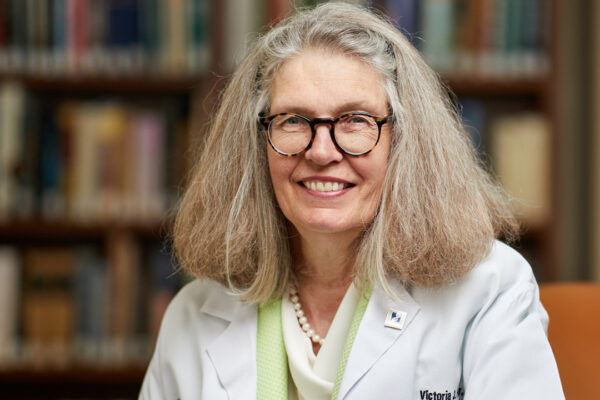“We need to wail. We need to scream. And if we can’t, we need to find some way to siphon out the pain, because grief is everywhere,” writes Merissa Nathan Gerson, AB ’04, in her first book Forget Prayers, Bring Cake: A Single Woman’s Guide to Grieving (Mandala Publishing 2021).
Gerson, a writer, speaker, educator and spiritual consultant, began writing the proposal for Forget Prayers, Bring Cake in 2019 as a way of coping after her father, Allan Gerson, became ill. “When he was sick, I knew I was using tools I wanted to share,” she says. “And writing it made me feel less alone, more connected to potential readers, more purposeful in my ebbs and flows of pain.”

Forget Prayers, Bring Cake
A Single Woman’s Guide to Grieving
In the book — part memoir, part self-help — Gerson provides an up-close view of processing her father’s illness, death and the “what comes next.” After her father passed on Dec. 1, 2019, Gerson was a woman navigating grieving while single. It was then she learned about the moirologist — a non-married woman hired for centuries in Egypt, South Africa, China and other countries as a professional mourner. In Forget Prayers, she becomes a moirologist for all of us as she unveils creative methods to finding the support we all need, whether single or not, during times of great loss.
Broken down into three parts — Life Before Death, Life After Death and the Future — the book’s chapters include “Home (Alone): What Do I Need? How Do I Even know?”; “Making Your Bed Your Lover, and Other Tools for Navigating Hell”; “Wills and Bills and Thrills, Oh My!”; “But Actually, Pray: Spiritual Practice as Life Partner”; “If There’s Such a Thing as ‘Completed Grief,’ This Is It”; and more. And it explores topics such as identifying your needs, setting up grief support, building an after-death checklist, how to pray, stabilizing your nervous system in a pinch, and then later on how to be the grief support for others and finding joy.
At the end of each chapter, Gerson offers a list of steps to consider for practicing self-care. “[The structure of the book] is definitely a nod toward my Ask Your Yenta days when I was an advice columnist,” says Gerson, who wrote the column that appeared in The Jewish Journal and other places from 2009 to 2011. “And … I bought and studied the structure of What to Expect When You’re Expecting, because I saw this as a parallel guide. That book takes you to the brink of birth and beyond, and this book attempts the same with death. I wanted it to be that direct, that comforting, that accessible.
“And, also, I know what grief brain is. I know how hard it can be to read a book, or what it feels like to have a panic attack and want a quick solution. Sometimes having easy answers on hand is all we want — it’s all I wanted — so I made that happen.”
— Merissa Nathan Gerson
Sharing ideas and tools for self-care and support has formed the core of Gerson’s career and life. As a WashU student, Gerson led the Committee Organized for Rape Education and the Committee on Sexual Assault (precursor to the Relationship and Sexual Violence Prevention Center) for three years. After graduating from Washington University in 2004 with a bachelor’s degree in women, gender and sexuality studies, Gerson earned an MFA in writing and poetics in 2008 from Naropa University’s Jack Kerouac School of Disembodied Poetics in Boulder, Colorado.
“Naropa taught me how to cut open a day and fill it with more meaning, more tenderness, more care,” Gerson says. “I learned from genius writer Bhanu Kapil about honoring history, honoring the body in this moment for how it might bend because of what happened a very long time ago.”
After receiving her MFA, she went on to earn another master’s degree in Jewish studies from the Graduate Theological Union in Berkeley, California, in 2013. Today, in addition to teaching an alternative journalism course at Tulane University, she teaches workshops on inherited trauma. She previously served as the intergenerational trauma consultant on the hit show Transparent.
“I witnessed a lot of grieving growing up and wanted to understand it.”
— Merissa Nathan Gerson
“My grandmother, Paula, lived with us for two years in high school. She missed her husband when he died. But she also wept for her mother, her father, her sister and others who were gassed to death in Nazi death camps. She wept for her time in slave labor camps in the Gulag — and for the baby she lost after her release.”
Gerson says she wove some of her research on the inheritance of trauma into Forget Prayers, Bring Cake. “The chapter on compounded grief is so important to me. It’s a chapter that was almost cut. I fought for it,” she says. “Because this kind of trauma — the kind that rattles a current life because of events before one is born, or because of the activation of traumas related to past histories never resolved — this, too, needs space.”
Gerson acknowledges that she wrote the book partly because of how hard it can be in our modern lives to make space for mourning. “And because I know how dangerous it is to our bodies, our families, our relationships and our lives when we don’t,” she says.
And perhaps we need her advice and recommendations today more than ever. “I intentionally never mentioned the pandemic,” she says. “It was here. It arrived three months after my father died. The grief of the pandemic is laced in the words of this book: It is the grief of loss of normalcy, of loss of safety, of actual loss of life, of losing trust in government or community …. But I think the same advice goes for all of that grief.
“It always comes back to you. To your body. To your bed. To your room. To your relationships with self and other. To your rituals. So, whether it’s one death or 10, whether it’s a pandemic, whether it’s year one or year seven of grieving, you will still wake up next to you. And that, each day, is where we begin. Tending us, tending our bodies, tending our hearts, tending our grief. No matter what.”


